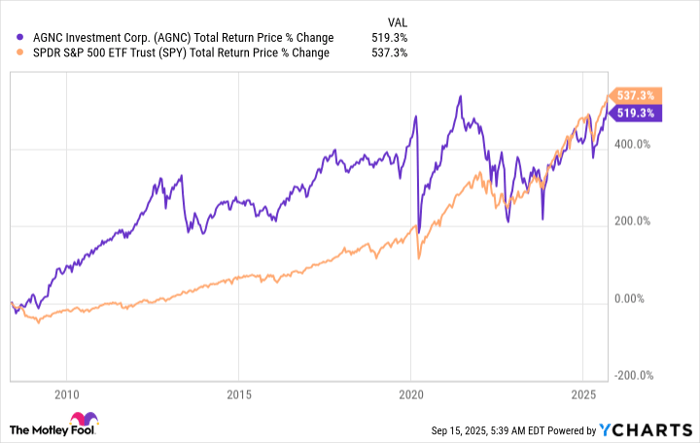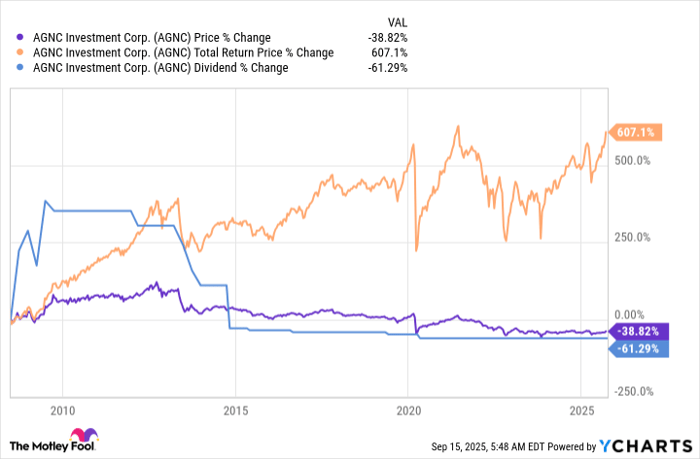Could Buying Ultra-High-Yield AGNC Investment Stock Today Set You Up for Life?

Key Points
AGNC Investment has a huge 14% dividend yield.
The real estate investment trust is focused on investing in mortgage securities.
AGNC Investment is a well-respected mortgage REIT, but history suggests that its dividend is not reliable.
There's one very big reason some income-focused investors might want to buy mortgage real estate investment trust (mREIT) AGNC Investment (NASDAQ: AGNC). That would be its astonishingly high 14% dividend yield. But a yield that high is highly unusual, given that the S&P 500 index (SNPINDEX: ^GSPC) yields only 1.2%, and the average REIT yields only 3.8%. If you're looking for an investment that will set you up for a lifetime of reliable dividends, you'll need to tread with caution here.
AGNC Investment is a decent mREIT
A double-digit dividend yield isn't particularly abnormal in the mortgage niche of the broader REIT sector. For the most part, AGNC Investment is a fairly well-run mREIT. Notably, the stock's total return since its initial public offering (IPO) is very compelling, as the chart below highlights. In fact, the total return is very close to that of the S&P 500 index. However, the return doesn't track along with the S&P 500, so AGNC Investment looks like an attractive diversification tool.
Where to invest $1,000 right now? Our analyst team just revealed what they believe are the 10 best stocks to buy right now. Continue »
AGNC Total Return Price data by YCharts.
If you're looking for a total return type of investment, however, AGNC Investment could be attractive for your portfolio. There's just one small problem. Total return requires the reinvestment of dividends. That makes sense, given the nature of the mortgage-backed securities that AGNC Investment buys.
When you make a mortgage payment, part of the payment goes to the principal and part goes to the interest. That doesn't change just because AGNC Investment owns mortgages that have been pooled into bond-like securities. Thus, every time AGNC Investment collects a payment on a security it owns, part is interest and part is principal. The huge dividends the mREIT pays are, similarly, made up partly of interest and partly of principal. That principal is effectively a return of investor capital.

Image source: Getty Images.
AGNC Investment's big dividend problem
The issue for dividend investors is that AGNC Investment's dividend hasn't been stable over time. In the table below, the blue line is dividends, and it has been highly volatile. After the IPO, the dividend rose sharply. Then it started to fall, and it's been heading lower for roughly a decade, as have the shares. Paying out principal, or returning capital to investors, means that the value of the portfolio inherently shrinks over time. That means that there's less capital to earn interest.
If you spend the dividends AGNC Investment pays you, you are, effectively, spending some of your own capital. To be fair, AGNC Investment has paid out more in dividends than it has lost in value since its IPO. So dividend investors have made out OK with this arrangement. But you still can't buy AGNC Investment and expect a reliable dividend to support your spending needs in retirement. That's just not on the table here, and the company's dividend history proves it. To be fair, the company itself highlights that its ultimate goal is total return, not dividend income.
AGNC is an acquired taste
AGNC Investment is not an easy REIT to wrap your head around. It's not a bad investment, but it is highly complicated to understand. More specifically for dividend investors, the dividend is not, and probably never will be, reliable.
Most dividend investors are looking for a stock that pays a dividend that's sustainable, if not growing, over time. If that's what you want, this 14% yield is very likely to let you down, no matter how attractive it looks relative to other high-yield dividend stock options you have.
Should you invest $1,000 in AGNC Investment Corp. right now?
Before you buy stock in AGNC Investment Corp., consider this:
The Motley Fool Stock Advisor analyst team just identified what they believe are the 10 best stocks for investors to buy now… and AGNC Investment Corp. wasn’t one of them. The 10 stocks that made the cut could produce monster returns in the coming years.
Consider when Netflix made this list on December 17, 2004... if you invested $1,000 at the time of our recommendation, you’d have $647,425!* Or when Nvidia made this list on April 15, 2005... if you invested $1,000 at the time of our recommendation, you’d have $1,071,739!*
Now, it’s worth noting Stock Advisor’s total average return is 1,056% — a market-crushing outperformance compared to 189% for the S&P 500. Don’t miss out on the latest top 10 list, available when you join Stock Advisor.
*Stock Advisor returns as of September 15, 2025
Reuben Gregg Brewer has no position in any of the stocks mentioned. The Motley Fool has no position in any of the stocks mentioned. The Motley Fool has a disclosure policy.









